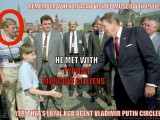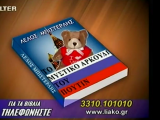A Sober Look: It's Time To Stop Romanticizing Russia
Since the start of the Crimea crisis, we've constantly heard that Germans somehow understand Russians. Indeed, hardly any other view has been repeated as often. But nothing could possibly be more misleading. The Germans don't understand Russians: They understand less about the Russians than they do about the British, Spanish or French.
It's true that Germany had a special relationship with the Russian Empire long ago. Germans served as czars and czarinas, once as the Russian prime minister, and they were officers, doctors and teachers in the royal court in St. Petersburg. German engineers operated ore mines in the Ural Mountains, German farmers plowed land along the Volga and Dnieper rivers. In turn, they were introduced to Russian writers. Pushkin introduced Germans to the strange but likable Russian soul. And cities like Moscow and St. Petersburg wouldn't be what they are today without Germans. That's the romanticized side of German-Russian relations.
Then came the wars of the past century and the devastation the Germans unleashed on the Soviet Union. Since then, the image Germans have of Russia is inaccurate.
The postwar generation grew up with a latent fear of the Russians. In the east of Germany, people saw them as an occupying force, while in the west many believed that an invasion was imminent. Then came Gorbachev. The Germans celebrated him because he gave them the gift of reunification. In one blow, the aversion of the 1960s and 1970s to everything that came out of the Kremlin seemed to be forgotten. It was a time of enthusiasm and relief, especially in the West. Gorbachev became a much-admired figure for Germans. They projected their fantasies for a new relationship between Germans and Russians on him and the new Russia. The Germans believed the Russians might somehow become just like them.
But
Russia isn't Europe, and it never will be. Russia never went through any period of enlightenment after the destruction wrought by Stalin on the country's soul. Germans never seriously considered that fact, because it would have interfered with their image of Russia.
They should have been warned. Not only because Mikhail Gorbachev in no way represented the kind of hard-nosed leaders the Russians had become accustomed to over hundreds of years. Nor did they listen to what Russian writer Aleksandr Solzhenitsyn had to say about perestroika's inventor. He said Gorbachev's leadership style wasn't governance, but rather "a thoughtless renunciation of power." Gorbachev ultimately became the most unpopular Kremlin leader in recent history.
The Soviet Union's implosion, which they blame on Gorbachev, didn't just rob them of their homeland. It also plunged them headfirst into a kind of capitalism that was even more reckless than Manchester capitalism. In no time at all, a handful of oligarchs appropriated the country's most precious assets and a majority of the Russian people fell into poverty.
Why Russians Can't Be Compared to the West
The Germans witnessed this drama as it happened, but they didn't understand what was going through the minds of Russians.
In her book "Second-Hand Time," Russian novelist Svetlana Alexievich seeks to explain why a citizen of the former Soviet Union cannot be compared with one from the West. "All of us, the people who came from socialism, are different from other people," she writes. "We have our own ideas about good and evil, about heroes and victims. We are full of hate and prejudice. We all come from the place that was once the home of gulags and of collectivization, or Dekulakization, the forced resettlement of entire populations. It was socialism, but it was also our lives." She then goes on to explain what happened after 1991. "Many conceived the truth (about our Soviet past) to be the enemy. The same applied to freedom. Russia changed, but also hated itself for this change."
The Germans believed that the Russians would be excited about glasnost and the new era. They hoped all Russians would be of the type that would be fans of groups like Pussy Riot. Even politicians who regularly traveled to Moscow spent most of their time speaking to members of the pro-Western minority who aren't really representative of Russia. This also happened for practical reasons: They were often the ones who could speak English.
Vladimir Putin sussed out very precisely the mindset of his compatriots. He himself comes from a very simple background, having grown up in modest accomodations in St. Petersburg. When he became president, he pacified Chechnya, deprived the oligarchs of their power and also created a bit of prosperity for the average Russian. Putin knew that the majority of Russians still longed for a strong leader and that they detested anything that even had a whiff of liberalism. He knew that this majority supports a firmer position against foreigners and anything "Un-Russian" as well as the reintroduction of the death penalty.
Putin's Conservative, Anti-Western Ideology
Putin pushed for greater power and applied a conservative, anti-Western ideology to justify it. "We can see how many of the Euro-Atlantic countries are actually rejecting their roots, including the Christian values that constitute the basis of Western civilization," Putin said in a speech given in September. "They are denying moral principles and all traditional identities: national, cultural, religious and even sexual." In a speech given in December, Putin cited 20th century Russian religious and political philosopher Nikolai Berdyaev, stating that "the point of conservatism is not that it prevents movement forward and upward, but that it prevents movement backward and downward, into chaotic darkness and a return to a primitive state." He believes Russia must lead the way. That sentiment strikes a deep chord in a people who fear further change after 80 years of experimentation that resulted in considerable bloodshed.
Those Germans who have friends in Moscow who occasionally come to see them also register that their acquaintances' previous enthusiasm for the West has been supplanted by a more critical view. Suddenly the German supermarkets have become too small for them -- much smaller than the ones in Moscow, and the selection is too limited, the people on the street are too reserved and the women dressed too shabbily. In contrast to the past, the Russian friends are keen to go back home these days -- they may speak negatively about their cities, but they are also proud of them. And of the greatness of their country. They are also pleased that Crimea once again belongs to Russia. Not even the most reflective of my acquaintances in Moscow try to conceal their belief that the return of Crimea is a completely natural course of events. In recent years, Putin has taken this kind of sentiment and applied it directly to his politics. This was evident even five or six years ago. We could have gotten used to it. Instead, it has come as a terrible surprise.
A Gulf of Opinions
How should we respond to the annexation of Crimea? The range of opinions is wide. Elderly statesman Helmut Schmidt represents one school of thought; Finance Minister Wolfgang Schäuble the other. Schmidt considers Putin's actions in the Crimea to be "understandable" and thinks the West is getting too worked up about it. He argues we must keep the peace. The former chancellor is a representative of the war generation. He served in the military under Hitler and one can certainly sympathize with his fears of renewed tensions in Europe. What is not acceptable is the attitude with which he tries to lecture fellow Germans that his view is the only one imaginable. Fellow Social Democrat Egon Bahr, who drafted former German Chancellor Willy Brandt's Ostpolitik of détente with the Soviet Union, goes even further by questioning the "legal basis of the current government in Kiev." But he ignores the fact that a majority of the opposition parties as well as the old block aligned with Viktor Yanukovych had accepted the correlating constitutional changes before the government changed.
Schmidt and Bahr both have an outmoded image of Russia that is based on 40-year-old thinking from the 1970s. Much has happened in Russia since then, but that was apparently lost on these two.
The fact that Schmidt's statement found such great resonance just goes to show that our image of the Russians is still shaped by old feelings of guilt and by our desire to clear ourselves of it. It also reveals our preference to try to find fault in ourselves instead. This distorts the image we have of Russia even further.
Russophiles are fond of saying that the West badly slighted Russia during the 1990s and that Moscow is now taking justified revenge for its defeat in the Cold War. But those who say this are overlooking the fact that
it was Western Europe that pushed the hardest at the time for the IMF and the World Bank to provide $40 billion in loans to Moscow. At the time, the oil price had fallen to $17 and Russia otherwise would have slipped into an economic catastrophe.
They also like to claim that NATO continued its expanse into the East despite its own pledges to the contrary, thus constricting Russia. However, the promise not to station any additional foreign troops or nuclear weapons only applied to the former East Germany. Of the 275,000 US soldiers that used to be stationed in Germany, only around 43,000 remain today. Moscow cannot truly perceive NATO as a military threat.
Indifferent Leadership
Finally, they argue that we must understand the urge of Russians in Crimea for the right to self-determination and the protection of a minority (in Ukraine). But the experience of the Chechen war showed us that Russian leaders were indiferent when it came to these lofty principles. The Chechens were denied their right to self-determination and the rebellious republic was bombed. When I sat in the bomb shelters of Grozny to cover the war, there weren't just Chechens there, but also Russians -- and the Kremlin didn't care about their fate. Many Russians were killed, by Russian bombs.
There's little in the current debate in Germany over Russia's Ukraine policies to suggest much in the way of expertise. People claim the new government in Kiev is fascist and has fallen into the hands of right-wing extremists and anti-Semitic forces. The far-left Left Party's claims are sheer nonsense. When were the party's intellectual leaders -- Gregor Gysi and Sahra Wagenknecht -- last in Kiev? If we're going to discuss developments in Ukraine, then we should also talk about right-wing extremists in Russia and the anti-Semitism that is tolerated there.
It's also nonsense to claim that Crimea is "ancestral Russian territory". As of 1441, Crimea belonged to the realm of the Tatary, a state that at one point stretched from today's Romania across the Caspian Sea to an area a short distance from Moscow. It wasn't until the 1700s that Potemkin used cunning and force to conquer the Tatars for Catherine the Great.
Force Remains a Proven Means in Russia
The Germans' romantic image of the Russians is to be blamed for Berlin's misguided policies toward the country and for the fact that the Kremlin is no longer inclined to take us seriously. The oft cited line is that we should be more inclusive of Russia rather than keep it at arm's length. That's what happened in 1996 when, in the midst of a war in Chechnya that had been launched by Moscow, Russia applied for membership in the Council of Europe, the continent's human rights watchdog. The appeasers prevailed with the argument that it was a way of preventing Moscow from entering into further acts of military force. The second Chechen war began three years later.
Force has remained a tried and true element of Russian policy since 1991. The kind of political compromise that is standard in the West is seen as a sign of weakness. And that thinking isn't just isolated to the Kremlin -- it's the mentality shared by most of Russian society. That's why you don't even find dissent against Crimea's annexation among Putin's opponents. This is fueled by a major Russian superiority complex. First the Russians spoke disparagingly of people in the Caucasus, calling them "our blacks." Despite the fact that they are in great demand in the labor market, the Tajiks and Uzbeks have never been much liked either. The Jews are the constant subject of discussion in Russia. Now the Russians are going on about the Ukrainians -- about their "Khokhol," a play on the hairstyles of Dnieper Cossacks during the medieval period, but also used today as a pejorative term in Russia for ethnic Ukrainians. The idea being that the Ukrainians are somehow a backward people.
And that takes us back to Wolfgang Schäuble. Many found the comparison he made last week of the occupation of Crimea with the Nazi occupation of the ethnic German Sudetenland in the former Czechoslovakia offensive. Of course it is absurd to compare Putin with Hitler. But astoundingly similar arguments were made in both the speech given by Hitler on Sept. 26, 1938 in Berlin and in Putin's appearance at the Kremlin on March 18 -- at least in the vocabulary about providing protection to compatriots located outside the country. Why should we keep quiet about that? And why should we keep quiet about the fact that the coverage on Russian television leading up to the annexation of Crimea, with all its lies and agitation, was reminiscent of Joseph Goebbels?
Germany is currently scratching its head over the best way to deal with Russia in the future. If we don't finally take a sober look at Russia, one that is erased of all romanticizing and historical baggage that distorts our view of Putin's world, then we will never succeed in finding a reasonable strategy.











